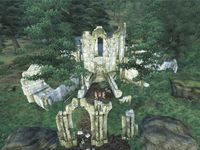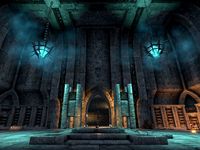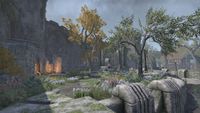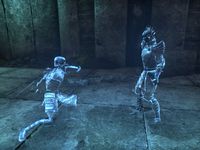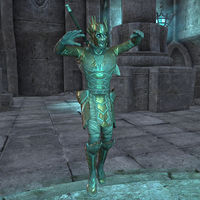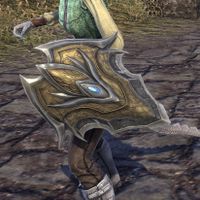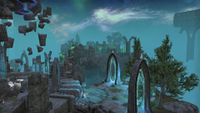Lore:Barsaebic Ayleids
The Barsaebic Ayleids (or simply the Barsaebics) were a First Era Ayleid subculture that emerged from the Aedra-worshipping Ayleids and were subsequently driven into exile following the Scouring of Wendelbek in 1E 198. They occupied northeastern Black Marsh and potentially parts of Blackwood.[1][2][3]
Contents
History[edit]
Barsaebic culture emerged as a result of the Narfinsel Schism, a civil conflict that spanned the Late Merethic Era to 1E 198 between the conservative Aedra-worshipping Ayleid clans and the Daedra-worshipping Daedraphile clans. The conflict was ended in 1E 198, when King Glinferen of Atatar led a combined force of Daedraphile warriors against the traditionalist Barsaebic forces of Wendelbek, driving the Aedra worshippers from the Heartlands of Cyrodiil and into Black Marsh.[1]
The Barsaebics went on to establish many settlements in Black Marsh, particularly in the regions of Arnesia,[4] Shadowfen, and Murkmire.[5] They were responsible for founding a number of major cities, including Silyanorn (modern-day Stormhold),[6][7] Twyllbek (modern-day Gideon),[8] Archon, and Thorn.[4] They came into conflict with the native Argonians, Kothringi, Orma, Yespest, Horwalli, and Lilmothiit in an attempt to carve out a place in the swamplands of Black Marsh.[4][9][10] One such conflict involved a Barsaebic attempt to locate the Remnant of Argon, a relic of the Root-Whisper Tribe of Argonians native to Deepmire. The Remnant was created by the tribe's Hist tree to protect the Argonians' souls from being stolen by the Barsaebic invaders.[10] The hunt for this relic resulted in the creation of Eld Angavar, a realm of Ayleid pathways and Nexus Gates. A group of Barsaebics ultimately invaded Root-Whisper Village but were unsuccessful in obtaining the Remnant.[11][12] An enormous battle between the Barsaebics and local Argonians is said to have taken place for control of the land where Silyanorn was eventually built.[13] The Barsaebics were also known to have enslaved local Argonians for use as laborers and flesh sculptures.[14]
In addition to their worship of the Aedra, the Barsaebic Ayleids venerated the Ten Ancestors, a set of statues traditionally held in the Temple of the Ancestors on City Isle.[15] Loriasel in Shadowfen was built by the Barsaebics as a temple to venerate the Ten Ancestors.[16] The Ayleids of Loriasel were responsible for the creation of keystones, relics of power that were created through the torment and fear of Argonian captives.[17]
When King Glinferen sent an envoy to Gideon seeking aid during the Alessian Slave Rebellion circa 1E 242, the Barsaebics bluntly refused to help. This is accredited with hastening the downfall of the Ayleid Empire in Cyrodiil.[18]
The Barsaebics eventually faded from history, leaving behind nothing but haunted ruins.[19][20] According to legend, the Ayleids of Stormhold were conquered by the Hist.[21] Although it is believed that the Barsaebic Ayleids were so far removed from the Heartlands that they were spared from Alessia's uprising,[4] some Barsaebic settlements were attacked by Alessian forces. For example, the Temple of Sul in Shadowfen was sacked by the Alessians.[14]
Some Barsaebic necromancer kings survived by becoming undead mummies. Known as Fenlords, these revenants are said to have once ruled Black Marsh. When their slaves rose against them, the Fenlords had them executed and revived as undead. They eventually disappeared, possibly as a result of Alessian persecution. Some instead believe that the Fenlords used the Crown of Ascension to leave Nirn forever.[19] In truth, some Fenlords continue to dwell in the depths of Barsaebic ruins, ruling over the undead servants that still guard their tombs.[22][19]
Gallery[edit]
Notes[edit]
- It is possible that Stormhold Crystal is of Barsaebic Ayleid origin.
See Also[edit]
- Ayleid Diaspora — A post-Alessian wave of Ayleid migration out of Cyrodiil
- Ayleid Ruins
References[edit]
- ^ a b Ayleid Survivals in Valenwood — Cuinur of Cloudrest, 4th Tier Scholar of Tamrielic Minutiae
- ^ Teldundindo of Sunhold's dialogue in ESO: Blackwood
- ^ The Silent Halls loading screen in ESO: Blackwood
- ^ a b c d Pocket Guide to the Empire, 3rd Edition: The War with the Trees: Argonia and the Black Marsh — Imperial Geographical Society, 3E 432
- ^ Elven Ruins in ESO
- ^ Stormhold, City of Shadowfen — Cirantille
- ^ Stormhold Outlaws Refuge loading screen in ESO
- ^ Twyllbek Ruins loading screen in ESO: Blackwood
- ^ Wet Wilds of Black Marsh — Cirantille
- ^ a b Famia Mercius's Journal, Part 3 — Famia Mercius
- ^ The Remnant of Argon quest in ESO: Murkmire
- ^ By River and Root quest in ESO: Murkmire
- ^ Antique Map of Shadowfen Antiquity Codex entry in ESO: Greymoor
- ^ a b Captured Time quest in ESO
- ^ Umbacano's dialogue in Oblivion
- ^ Loriasel loading screen in ESO
- ^ Keystones of Loriasel
- ^ Chancellor Abnur Tharn Answers Your Questions — Chancellor Abnur Tharn
- ^ a b c Zahra's dialogue during Riches Beyond Measure in ESO
- ^ The Wild Elves — Kier-Jo Chorvak
- ^ Aide Diina's dialogue in ESO
- ^ Fenlord in ESO
| ||||||||||||||||||||||||||||||||||||||||||||||||||||||||

